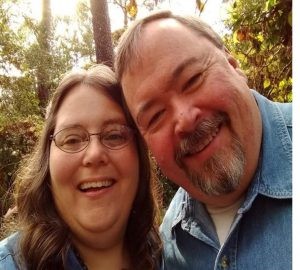
by Niki Crawson | Nov 1, 2019
November is National Inspirational Role Models Month
Before the medals and the ribbons and the physical manifestations of success, there is a club, a meeting, and adult, a friend that changes the life of a youth. Someone that gives youth the confidence to believe in themselves. Someone that they can look to as an example to follow. The Oxford dictionary defines a role model as “a person looked to by others as an example to be imitated.” In the midst of the social media culture where people have the potential to drastically influence a person’s life without ever holding a conversation, it is essential that youth have positive role models who will guide them in an ever changing society.
Organizations like 4-H, where programming is highly reliant on the dedication of volunteers, there are innumerable individuals who function as role models. Though there are many individuals, I have often found that most great role models function in similar manners and styles. Each style is as unique as each person, more important is the fact that each individual has an impact on the youth around them, consciously or not. Some individuals strive to have a significant impact on youth such as Angela Tinker. As the leader of the county wide Leadership Club, Angela Tinker is a positive role model and a consistent presence in the lives of the youth she works with. She is a shining example of just one of the many 4-H volunteers who serve to inspire youth as positive role models.
The Shepherd: Angela Tinker
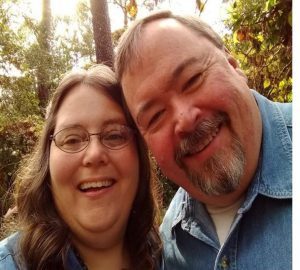
Pictured is Angela Tinker with her husband, Bill Tinker. Angela has served as an Escambia County 4-H Volunteer since 2008.
The role of the shepherd is to look after the safety and welfare of their flock. As youth grow older and near the completion of their 4-H careers, youth not only want to demonstrate their independence, but they need a safe environment in which to do it. They also need individuals who will lead them, and more importantly who will lead them by example.
Angela Tinker exemplifies a shepherd. She has worked as an Escambia County 4-H volunteer for eleven years. Over the course of her tenure, she has worked with younger youth as well as teenagers. She continues to lead the Leadership Club where she works with teenagers. When asked why she continues to serve as a volunteer, even though both of her daughters have graduated and moved on from the program, Angela responded, “seeing the little successes, which turn into big successes.” It is her passion to cultivate an environment in which the little successes of everyday emerge as life altering successes that enables her to be the role model these youth see when working with her.
Our Future
Angela is a role model that leads by quietly tending to the youth she works with, and by ensuring that they have the best opportunities to grow and build their skills. As budding adults, the youth Angela works with are in some of the most formative years of their lives. Everything and everyone that these youth encounter shapes them in one way or another. It is the positive role models in the 4-H organization like Angela who ensure that our youth have the best chance to develop into the best person possible. Angela is an example of the 4-H way of “Making the Best, Better” every day.
Who Do You Inspire? Become a Role Model – Become a 4-H Volunteer
If you have knowledge or skills that you can share with youth in your community, consider becoming a 4-H volunteer! 4-H is always in need of caring, positive adult role models to serve in the role of 4-H volunteers. From leading a club to judging public speaking or teaching a craft project, contact your local UF/IFAS County Extension Office or visit our website to learn how you can serve as a positive adult role model today to make a difference in the lives of our youth tomorrow.
Special thanks to Aly Schortinghouse, UF/IFAS Escambia County 4-H Agent, for providing this article and picture.
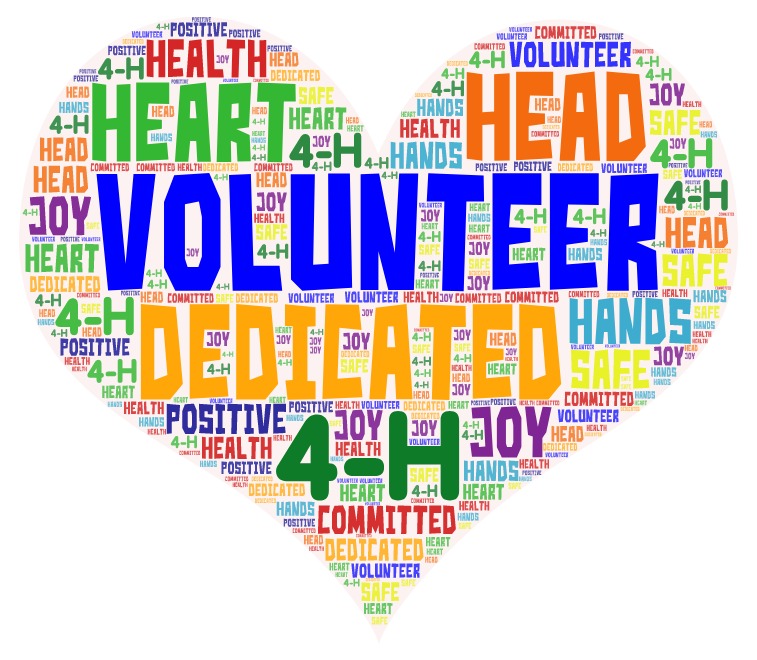
by Niki Crawson | Aug 16, 2019
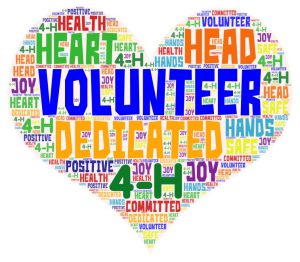
The goal of 4-H is to teach youth essential life skills. In so doing, we find that we also equip them with marketable skills, a sense of belonging, and a sense of self-worth, each of which makes them more apt to be successful. However, besides the most obvious benefit that your volunteer services are to your local youth and community, there are benefits for you personally as well. In fact, studies indicate that individuals who volunteer experience greater health benefits such as an increase in social skills, an expanded social calendar and even a decline in depression.
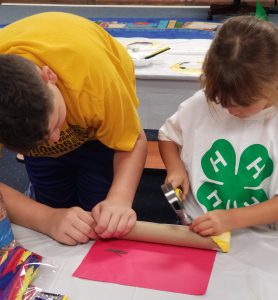
A teen volunteer helps a Cloverbud member during a summer workshop
Another thing to consider is that by volunteering with 4-H you will have the opportunity to make a positive difference in the lives of children. This more than likely will trigger a sense of commitment, pride, and accomplishment in you which leads to a more positive self-image. The more positive your self-image, the more likely you are to set and accomplish positive personal goals, thus feeling a sense of accomplishment which creates a continuous circle of self-worth and confidence.
One of the most undervalued benefits of volunteering with 4-H is the time spent practicing the very life skills you are teaching through 4-H programming like communication, teamwork, and program planning. As you work with your youth to help them develop these life skills, you too are strengthening them in yourself. When they combine their increased life skills with taking part in the wide variety of training opportunities presented through 4-H, some volunteers may open new doors for employment based on the skills they have learned and developed.
In today’s time when families are busier than ever and time seems limited, having a positive adult role model can truly influence the path of youth. Volunteering with a 4-H program allows these positive impacts to occur. If you are already a 4-H volunteer, take pride in your contributions and reap the joy and benefits associated with such. If you are not currently a volunteer, the great news is that you do not have to look far to find a perfect match for your volunteer services…the Florida 4-H program welcomes you, and area 4-H Agents are eager to help you get started!
Now is the perfect time to start your path to volunteering and making a difference! The new 4-H year begins September 1, 2019 and all counties across the state of Florida are in need of positive adults to serve in the role of volunteer. Whether you are interested in working directly with youth to lead a 4-H club or would like to assist behind the scenes in preparing others to facilitate outstanding 4-H programming, Florida 4-H needs dedicated individuals to carry out its mission.
So, go ahead. Reap the benefits of volunteering! Join the 4-H family today. The process to become a volunteer is relatively simple: visit http://florida4h.org to apply online or stop in to your local UF IFAS County Extension Office and meet with your 4-H Extension Agent for assistance.
by Yolanda Goode | Mar 15, 2019

Are you physically or mentally running on E?
Are you racing “90 to nothing” in your daily life? until something forces us to hit the brakes or the emergency brake is applied. Instead of clearing our plates, we add sideboards onto them so that we can accept more.
We wear many hats outside of work such as a family member, caregiver, volunteer, student, etc. Some days we find ourselves in foul moods where we lack comprehension, patience, and focus. Is it because we are hangry (hungry + angry) or just plain ole tired? You’ve heard the saying; “you can’t squeeze blood from a turnip”… or is that a beet?…LoL, you get the point. How do we avoid the breakdown that can and will happen if we keep pushing ourselves without intentional refueling?
Here are several tips to help you stay fueled and refreshed:
- Block scheduling: I shared a photo of a tool that I use, but you use what works for you. The key thing is for you to understand where you can capture time for yourself to refuel.
- Rest: Sleep on a regular schedule and take breaks during the day.
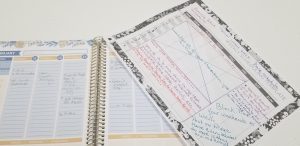
- Eat well: physically, mentally, emotionally, and spiritually.
- Have some fun: You are encouraged to have fun. Adulting is tough.
- Take lunch: Go visit a local library, museum, or sit in your car at a local park.
- Vacation: Plan for it, and take it. But leave some recovery time, so you are not rushing back to work the next day. Another option is weekend trips or a day-cations while kid(s) are at school.
- Nurture your hobbies: When was the last time you ____________?
- Guard your time: Once you’ve blocked it out, it’s yours. Don’t let others guilt you into giving it back.
Slowly implement some of these tips into your life, and remember an empty tank is just that. Empty. You will be more productive by taking care of you, and you’ll be better able to wear all those hats.
by Whitney Cherry | Mar 8, 2019
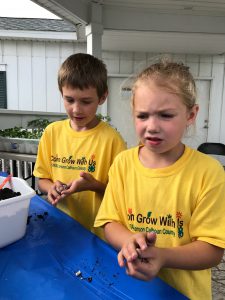
Wildflower seed bombs are a great indoor or outdoor project with unlimited potential for learning.
Wildflower seed bombs are the perfect project for kids itching to get outside. Even if you don’t have a green thumb or you don’t have outdoor space or the weather isn’t cooperating, you can make seed bombs that will help beautify roadsides, vacant areas and neighborhoods.
Give Them a Toss!
These little beauties don’t get their name from any explosive properties but from the fun you have “launching” them around your yard or neighborhood. As you toss them into places that aren’t frequently mowed, you beautify your neighborhood and provide an invaluable food sources for native Florida pollinators like bees, wasps, butterflies, and more.
Even though you may be more fond of some pollinators than others, there’s no doubt we need them all. Their pollination services are critical to fruit development in many of our fruiting crops. So if you like squash, cucumbers, melons, almonds and so much more, here’s what you can do to help:
Gather Your Materials
- Air-dry clay
- Wildflower seeds
- Potting Soil
Make Your Seed Bombs
- Pinch off a small amount of air-dry clay – enough to make a ball about the size of a bouncy ball or about 1″ diameter.
- Work equal parts seeds and soil into the clay and form it into a ball.
Amounts really are up to you. More seeds = more flowers.
But, too much soil will keep the ball from holding it’s shape. If this happens, add more clay and either have a bigger bomb, or divide it into two smaller bombs.
- Store them in a cool dry place and let them dry out completely in an air-tight container until you’re ready to spread some wildflower cheer.
- Now for the fun part! Toss them where you want flowers to grow.
Things to Consider…
- The air-dry clay acts as a binder only. It’s natural, non-toxic, and when wet, it will soften and allow the seeds to grow.
- Before storing in an airtight container, allow your seed bombs out to dry completely. Even a little moisture will allow the seeds to sprout.
- Be careful when throwing your seed bombs.
- Don’t hit people, animals, or other anything else with them – just the ground.
- Throw them where areas don’t get mowed very much. Some people throw them out along roadways or in abandoned lots. If these places are mowed regularly, they won’t last long if they even get to bloom.
- Get permission if you’re throwing them in public places.
Resources
Gardening is just one of the many Florida 4-H programs. To see what programs are available in your county, contact your local UF/IFAS Extension office, or contact your 4-H Agent about starting a gardening program in your county.
by Yolanda Goode | Feb 22, 2019
Generosity is one of the four essential elements youth need for positive youth development. 4-H clubs should do at least one community service project a year as part of their plan of action. This benefits our high school students because most students need service hours as part of graduation requirements. But with all the “have-to-do’s” in life, service can become just a thing to check off and have no real value.
How can we help our 4-H youth get more value from service projects?
Use the Experiential Learning model (Do-Reflect-Apply) used by 4-H programs across the nation. Incorporating the reflect and apply portion of the model does take some effort, but it is not hard to do. If your club does many community service activities, choose which ones to incorporate all the steps of the Experiential Learning model.
How to take it deeper beyond just a thing to do:
Get buy in from youth concerning the service project(s) planned for the year.
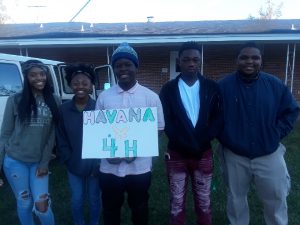
UF/IFAS Extension Gadsden County 4-H Club members out delivering Thanksgiving baskets to families in need.
Pre-activity – Have youth do a presentation related to the service project activity:
- Who we are helping: Details about the group/organization
- What type of service(s) will be done for the group
- How will our community service benefit this group/organization
Post activity – have a casual conversation:
- Enquire about how they felt about the service activity
- What was an ah-ha moment
- What did they find challenging
- What could we do differently for next project
- What is something you learned by doing this project that you could use in other areas of your life.
Here’s a great article in the Florida 4-H Volunteer Training Series that really breaks down the process. You can also give your local UF/IFAS Extension 4-H Agent a call for more help.
How can you keep up with the great things we’re doing in our 4-H extension district?
- LIKE the 4-H in the Panhandle Facebook page – @volunteeringinthepanhandle
- LIKE your county’s 4-H Facebook page
- SUBSCRIBE to the 4-H in the Panhandle blog
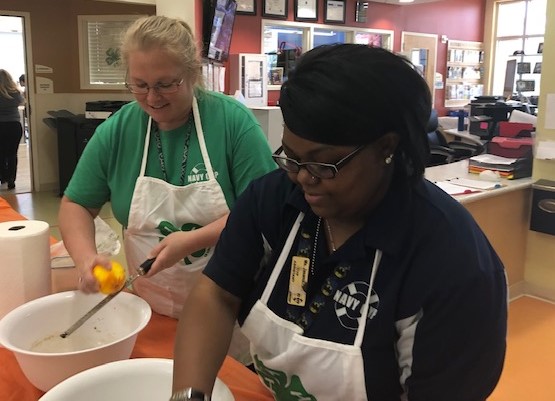
by pmdavis | Feb 14, 2019
Making lotions and bath scrubs, practicing relaxation and doing yoga…doesn’t this sound like a great 4-H club program? Discover 4-H Spa and Relaxation Clubs are a great way to learn about homemade body products while learning relaxation techniques. Youth create a day at the spa by making lotions, soaps, scrubs and lip balms while learning methods to relax like tennis ball massages, creating a happy list, doing yoga and creating a zen garden. An added bonus is homemade products are a fraction of the cost of purchasing and make great gifts for friends and family.
Make your own Luxurious Bath Salts
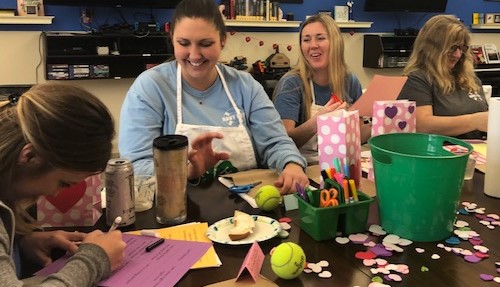
Naval Support Activity-Panama City staff learning how to making calm bags.
- ½ cup baking soda
- ½ cup powdered milk
- 1 cup sea salt
- 1 cup Epsom salt ( scented or plain)
- Use 3-5 drops fragrance oil designed for soaps or diluted essential oil for plain Epsom salt
- Mix ingredients
- Spoon the mixture into storage containers (wide mouth jars, bowls or zip style bags work well)
- Label your container with ingredients and direction for use – Pinterest has several cute label designs
Caution: Essential oils are very strong and can be a skin irritant if applied directly to your skin. National Association for Holistic Aromatherapy recommends diluting essential oils with a carrier oil: use 1 teaspoon of coconut, almond, olive, sunflower or jojoba oil with 2 – 12 drops of the desired essential oil. Then, mix 3-5 drops of the diluted oil to your bath salt mixture. Bath salts are generally safe for most when used properly, but you should talk to your doctor before using bath salts if you have medical conditions such as skin diseases, heart disease or diabetes.
How to Use Your Bath Salts: Fill your tub halfway with warm to hot water, and pour in about 1/2 cup (120 g) of bath salts. For a stronger concentration, you can always add more. If you prefer showers, take a handful and rub over desired area. Bath salts are great to exfoliate by removing dead skin cells leaving the skin smooth and fresh. Tired achy feet or hands? No problem! Add salts to warm water in a dishpan, and immerse your feet or hands and soak away the pain.

NSA-PC staff learning the 4-H Spa & Relaxation Curricula they will use in their 4-H programs.
For more information on 4-H and other programs like this, contact your local UF/IFAS County Extension Office, or visit Florida 4-H.
Are you an adult looking for ways to coach, teach and mentor youth? Contact the 4-H Agent in your county and enroll as a volunteer in 4-H Online. Volunteering not only strengthens the 4-H club, but also shows young people how to live with integrity, optimism, hope, determination, compassion, responsibility and resiliency – skills that will help them succeed in life.
Resource:
Discover 4-H Spa and Relaxation Clubs curriculum











